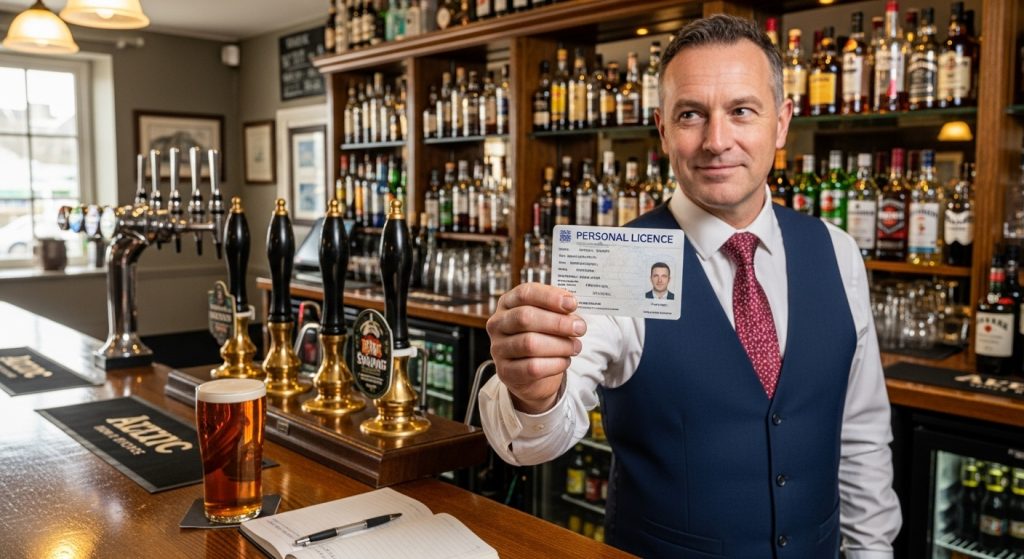
For any UK pub landlord or manager, understanding and complying with alcohol licensing laws isn’t just good practice – it’s a legal imperative. A Personal Licence is your key to authorising alcohol sales, a fundamental requirement for any successful pub operation. But with so many training providers offering the essential APLH qualification, how do you choose the best one for you or your team? This comprehensive guide cuts through the noise, reviewing the top 5 Personal Licence training providers in the UK, helping you make an informed decision. Get ready to streamline your compliance journey and ensure your pub thrives legally and profitably. Don’t forget to grab our free ‘Personal Licence Application Checklist’ at SmartPubTools.net/freebies to kickstart your journey!
TL;DR: Key Takeaways
- A Personal Licence is legally essential for authorising alcohol sales in UK pubs, requiring the APLH qualification.
- Choose providers based on accreditation (Ofqual, Highfield, BIIAB), course delivery (online/classroom), comprehensive content, and strong reviews.
- Top providers include Innpacked, PLT UK, Highfield/BIIAB approved centres, and Personal Licence Hub (http://gl-link.co/6GWEY).
- Costs typically range from £99-£180 for online courses and £150-£250 for classroom, plus a £37 council application fee and £18 for a Basic DBS check.
- Post-course, apply to your local council with your APLH certificate, Basic DBS, photos, and fee.
- Maintaining your licence involves staying updated on laws, reporting changes, and safeguarding your document.
Table of Contents
- Understanding the Vital Role of Your Personal Licence
- What to Look For in a Personal Licence Training Provider
- Top 5 Personal Licence Training Providers Reviewed
- Online vs. Classroom: Choosing Your Learning Path
- Cost Considerations: APLH Training & Licence Application
- The Personal Licence Application Process: Post-Course Steps
- Maintaining Your Personal Licence: Beyond the Qualification
- Your Essential Personal Licence Toolkit & Ongoing Compliance Checklist
Understanding the Vital Role of Your Personal Licence
Before we dive into the specifics of training providers, it’s crucial to understand why the Personal Licence is so fundamental to your operation. Under the Licensing Act 2003, any premises in England and Wales that sells or supplies alcohol must have a Designated Premises Supervisor (DPS) who holds a valid Personal Licence. This individual is responsible for authorising every sale of alcohol. Without a DPS, your pub simply cannot legally operate. It’s not merely a piece of paper; it signifies a commitment to responsible alcohol retailing, understanding the law, and protecting the public. Failing to comply can lead to severe penalties, including hefty fines, licence suspension, or even revocation, jeopardising your entire business. Beyond compliance, holding a Personal Licence demonstrates professionalism and competence, enhancing your standing within the industry and with your local licensing authority. It empowers you and your team to confidently manage alcohol sales, handle challenging situations, and contribute positively to your community. This licence is a badge of honour, showing that you are a responsible operator who understands the social impact of alcohol sales. It’s a key component of effective risk management, ensuring that you and your staff are fully aware of your legal obligations regarding underage sales, prevention of disorder, and public safety. Moreover, if you plan to eventually become the DPS for your own pub, or even if you simply want to progress your career in hospitality management, obtaining this licence is an essential step. It opens doors to greater responsibility and demonstrates your dedication to the industry’s best practices. Investing in this qualification is investing in the long-term sustainability and reputation of your establishment.
What to Look For in a Personal Licence Training Provider
Choosing the right APLH training provider can significantly impact your learning experience and ultimately, your success. With numerous options available, it’s easy to feel overwhelmed. Here’s what discerning pub landlords and managers should prioritise when evaluating potential providers:
Accreditation and Recognition
First and foremost, ensure the provider is accredited by an official awarding body recognised by Ofqual (the Office of Qualifications and Examinations Regulation). Common awarding bodies include Highfield Qualifications, BIIAB (British Institute of Innkeeping Awarding Body), and Pearson Edexcel. Without proper accreditation, your APLH certificate might not be accepted by your local licensing authority.
Course Delivery Method: Online vs. Classroom
Consider your learning style and schedule. Online courses offer flexibility, allowing you to study at your own pace from anywhere. They often include interactive modules, videos, and practice questions. However, they require self-discipline. Classroom courses provide a structured learning environment, direct interaction with an instructor, and opportunities for group discussions, which can be beneficial for those who prefer face-to-face learning or have specific questions. The choice depends entirely on your personal preference and logistical constraints.
Course Content and Materials
Look for providers that offer comprehensive, up-to-date content covering all aspects of the Licensing Act 2003, including: the roles and responsibilities of a Personal Licence holder, alcohol and its effects, preventing disorder, protecting children from harm, permitted hours, and the various types of licences. High-quality study materials, mock exams, and revision guides are invaluable for exam preparation. The best providers will not just teach you to pass the exam, but to truly understand the nuances of the law.
Exam Structure and Support
Inquire about the exam format (usually multiple-choice) and how it’s invigilated. For online courses, this often involves remote proctoring via webcam. Understand the pass mark and what support is offered if you don’t pass on your first attempt (e.g., free resits or discounted retakes). Excellent customer support, before, during, and after the course, is a strong indicator of a reputable provider.
Cost and Value for Money
While price shouldn’t be the sole deciding factor, it’s an important one. Compare costs, but also consider what’s included: study materials, exam fees, resit policies, and any additional resources. Sometimes, a slightly higher price might include better support or more comprehensive materials, offering better value in the long run. Be wary of extremely cheap courses that might compromise on quality or accreditation. Look for transparent pricing with no hidden fees.
Reputation and Reviews
Check independent reviews on platforms like Trustpilot, Google Reviews, or industry forums. Look for feedback from other pub landlords and managers. A provider with consistently high ratings and positive testimonials regarding their course content, support, and ease of use is generally a safe bet. Word-of-mouth recommendations from peers can also be highly valuable.
Top 5 Personal Licence Training Providers Reviewed
Navigating the array of APLH training providers can be daunting. To help you make an informed decision, we’ve meticulously reviewed five of the UK’s leading options, considering their course structure, delivery, support, and value for money.
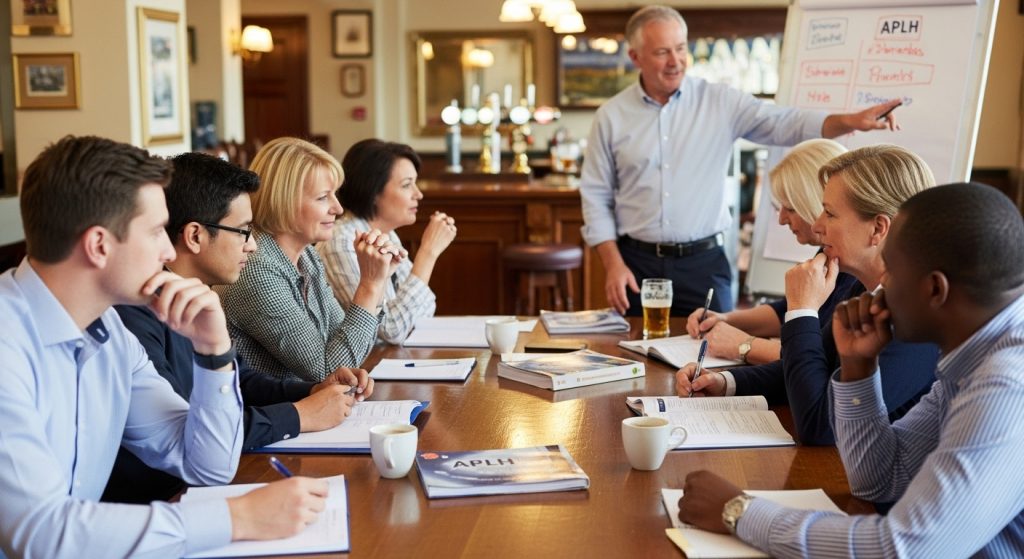
1. Innpacked (Highly Recommended)
Innpacked stands out as a highly reputable provider, offering both online and classroom-based APLH courses. Their online platform is particularly strong, featuring interactive modules, video tutorials, and practice questions designed to cater to various learning styles. They are known for their excellent customer support, providing clear guidance throughout the entire process, from booking to receiving your certificate. Their pass rates are consistently high, a testament to the quality of their teaching materials and exam preparation. Innpacked often includes the exam fee and a free resit in their package, offering peace of mind. They are accredited by Highfield Qualifications, ensuring your certificate is widely recognised and accepted by all local licensing authorities across the UK. Their course content is regularly updated to reflect the latest changes in the Licensing Act 2003, providing current and relevant information. Many pub landlords praise their user-friendly interface and the practical application of the knowledge taught. The flexibility of their online course makes it ideal for busy pub professionals who need to fit study around their demanding schedules. For a reliable and comprehensive training experience, Innpacked is a top choice.
2. Personal Licence Training UK (PLT UK)
PLT UK offers a streamlined and efficient route to your APLH qualification, focusing on making the learning process as straightforward as possible. They primarily offer online courses, which are self-paced and accessible 24/7. Their materials are well-structured, breaking down complex licensing law into digestible sections. PLT UK is known for its competitive pricing, often providing one of the more affordable options without compromising on accreditation (typically Highfield or BIIAB). They provide robust online support and have clear instructions for booking your remotely invigilated exam. Their website is easy to navigate, and the booking process is simple. While their course might be more text-heavy than some others, it’s thorough and covers all the necessary legal requirements. They are a solid choice for those who prefer a no-frills, cost-effective, and efficient online learning experience. Their focus on clarity helps ensure that even those new to licensing law can grasp the essential concepts effectively.
3. Highfield Qualifications Approved Centres (Various)
Highfield is one of the most prominent awarding bodies for the APLH, and many independent training centres across the UK are approved to deliver their qualification. This means you can find local classroom courses or online options that adhere to Highfield’s rigorous standards. The advantage here is the widespread availability and the assurance of quality that comes with the Highfield brand. When choosing a Highfield-approved centre, it’s wise to check their specific delivery methods, instructor experience, and local reviews. Examples include local colleges, private training firms, and even some larger pub companies that run internal training. The quality can vary slightly between centres, so always do your due diligence on the specific centre you choose. However, the core curriculum and examination standards are consistent, ensuring a recognised qualification. This option provides a great deal of flexibility in terms of finding a course that suits your geographical location or specific scheduling needs.
4. BIIAB (British Institute of Innkeeping Awarding Body) Approved Centres
Similar to Highfield, BIIAB is another highly respected awarding body in the hospitality sector. Many training providers, often with a strong connection to the pub and bar industry, offer BIIAB-accredited APLH courses. The BIIAB qualification is specifically tailored to the nuances of the licensed trade, making it particularly relevant for pub landlords and managers. These courses often come with the added benefit of industry insights and practical examples that resonate well with experienced professionals. You can find BIIAB courses offered by regional training companies, industry associations, and even some brewery training programmes. Like Highfield, the key is to research the specific centre delivering the BIIAB course. Look for centres with experienced instructors who have real-world pub experience, as this can greatly enhance the learning experience. The BIIAB brand signifies a commitment to industry best practices and a deep understanding of the challenges faced by licensed premises.
5. Personal Licence Hub (http://gl-link.co/6GWEY)
Personal Licence Hub, accessible via this link (http://gl-link.co/6GWEY), is another excellent option for securing your APLH qualification. They provide a comprehensive online course designed for maximum convenience and effectiveness. What sets them apart is their focus on user-friendly design and robust support. Their platform is intuitive, making it easy to navigate through modules and prepare for the exam. They offer a flexible study schedule, allowing you to complete the course at your own pace, which is ideal for busy individuals in the hospitality sector. Personal Licence Hub ensures their content is up-to-date with the latest legal requirements and provides ample practice questions to build confidence for the final assessment. They are accredited by a recognised awarding body, guaranteeing the validity of your certificate for your Personal Licence application. Their customer service is highly responsive, offering prompt assistance for any queries you might have during your learning journey. For those seeking a reliable, flexible, and well-supported online APLH course, Personal Licence Hub is a strong contender worth exploring through the provided link.
Online vs. Classroom: Choosing Your Learning Path
The decision between an online or classroom-based APLH course is a significant one, and it largely depends on your personal circumstances, learning preferences, and schedule. Both methods have distinct advantages and potential drawbacks.
Online APLH Courses: Flexibility and Convenience
Online courses have surged in popularity, especially for busy professionals like pub landlords and managers. Their primary appeal lies in unparalleled flexibility. You can study at any time, day or night, fitting your learning around your pub’s opening hours, family commitments, or other responsibilities. This ‘study-at-your-own-pace’ model means you can take as long or as short a time as you need to grasp the material, revisiting complex sections as often as required. Most online platforms are highly interactive, incorporating videos, quizzes, and digital resources to keep you engaged. They often prove to be more cost-effective as well, eliminating travel expenses and offering competitive course fees. The final exam for online courses is typically conducted via remote invigilation, using a webcam and screen sharing software, allowing you to take the exam from the comfort of your home or office. This removes the need to travel to a test centre. However, online learning demands a high degree of self-discipline and motivation. You’ll need a stable internet connection and a quiet environment for studying and the exam. If you struggle with independent study or prefer direct human interaction, this might be a challenge. Technical issues can also occasionally arise, requiring prompt support from the provider.
Classroom APLH Courses: Structure and Interaction
Classroom-based courses offer a more traditional learning experience, usually spanning one or two full days. These are ideal for individuals who thrive in a structured environment and benefit from direct interaction with an instructor and fellow students. The immediate feedback from an experienced trainer can clarify doubts instantly, and group discussions can provide valuable real-world perspectives from other pub professionals. This shared learning environment can foster networking opportunities and a sense of camaraderie. The exam is typically taken on-site immediately after the training, providing a clear endpoint to the learning process. For some, the dedicated time away from the pub’s distractions can lead to more focused learning. The main downsides include less flexibility in scheduling, as you must attend specific dates and times. Travel to the training venue can incur additional costs and time. Classroom courses are also generally more expensive than their online counterparts. If you have a very unpredictable schedule or prefer to learn independently, a classroom setting might feel restrictive. However, for those who value guided instruction and peer interaction, the classroom experience can be highly effective and enjoyable, providing a comprehensive understanding of the legal framework and practical implications.
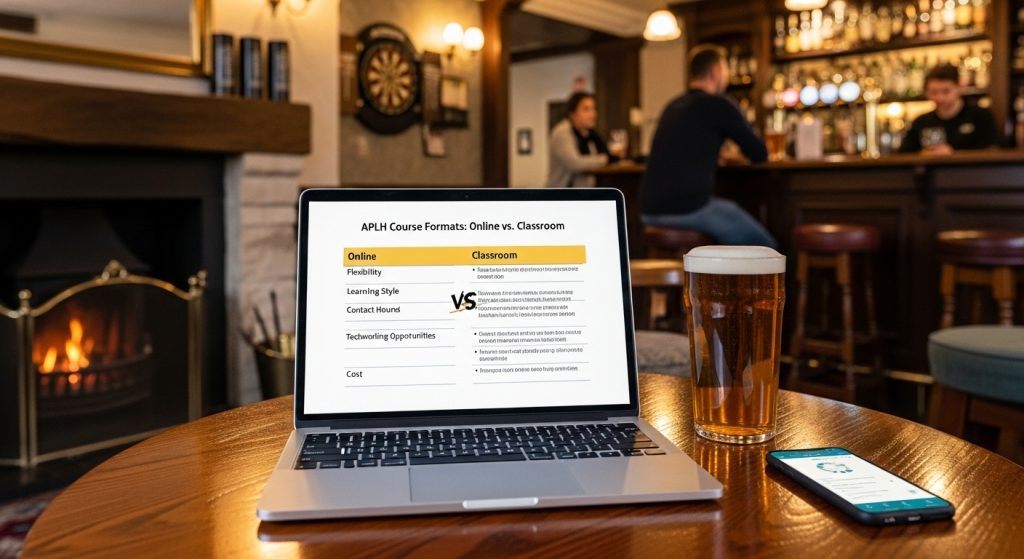
Cost Considerations: APLH Training & Licence Application
Understanding the financial commitment involved in obtaining your Personal Licence is crucial for budgeting and planning. The costs are generally divided into two main categories: the APLH training course itself and the subsequent application for the Personal Licence to your local council.
APLH Course Costs
Prices for the APLH qualification vary significantly depending on the provider, the delivery method (online vs. classroom), and what’s included in the package.
- Online Courses: These are typically the most budget-friendly option, ranging from £99 to £180. This usually includes access to online study materials, mock exams, and the final remotely invigilated exam. Some providers offer a free resit if you don’t pass on your first attempt, which adds considerable value. Always check if the exam fee is included in the quoted price, as some cheaper options may list it separately.
- Classroom Courses: Expect to pay more for face-to-face instruction, with prices generally falling between £150 and £250. These costs usually cover the instructor-led training, all study materials, and the on-site exam. The higher price reflects the added value of direct interaction, a structured learning environment, and often, catering or refreshments provided during the day. Location can also influence the price, with courses in major cities sometimes being slightly more expensive.
What to look out for: Always scrutinise what’s included in the package. Are there any hidden fees for study materials, exam booking, or resits? Some providers offer ‘bundle deals‘ that include the APLH course, the DBS check, and even the Personal Licence application support, which can be a good value if you need all components.
Personal Licence Application Costs
Once you have your APLH certificate, you’ll need to apply to your local licensing authority for the Personal Licence itself. This involves a few separate costs:
- Personal Licence Application Fee: A statutory fee of £37 is payable to your local council. This fee is set nationally and is non-negotiable.
- Basic DBS Check: You are required to submit a Basic Disclosure and Barring Service (DBS) check with your application. The cost for a Basic DBS check is currently £18 (as of 2024). You can apply for this directly online via the Gov.uk website or through an approved umbrella body. It’s crucial that this check is recent, typically within one month of your Personal Licence application.
- Passport Photos: You’ll need two passport-sized photographs, one of which must be endorsed by a ‘responsible person’ (e.g., a solicitor, doctor, or someone of good standing in the community) confirming it’s a true likeness of you. The cost for these is minimal, typically around £5-£10 from a photo booth or photography service.
Total Estimated Cost: When you factor in the course, DBS check, application fee, and photos, the total cost for obtaining a Personal Licence can range from approximately £159 to £300+, depending on your chosen training provider and any additional services you might opt for. It’s a worthwhile investment for the longevity and legal compliance of your pub.
The Personal Licence Application Process: Post-Course Steps
Passing your APLH exam is a significant milestone, but it’s just the first step towards holding your Personal Licence. The next stage involves a formal application to your local licensing authority. This process, while administrative, requires precision to avoid delays.
1. Gather Your Documents
First, you’ll need your APLH certificate – the proof you’ve passed the qualification. Next, you must obtain a Basic Disclosure and Barring Service (DBS) check. This check confirms your criminal record status and is a mandatory part of the application. You can apply for a Basic DBS online via the Gov.uk website. Ensure it’s current, typically issued within one month of your licence application. You’ll also need two passport-sized photographs. One of these must be endorsed on the back by a ‘responsible person’ (e.g., a solicitor, doctor, teacher, or other professional) confirming it is a true likeness of you. This is a crucial step to verify your identity.
2. Complete the Application Form
Most local councils provide a standard Personal Licence application form, often available for download from their website. This form will ask for personal details, your APLH qualification details, and information regarding any previous convictions. Fill this out accurately and completely. Don’t leave any sections blank; if a question isn’t applicable, write ‘N/A’. Incomplete forms are a common reason for delays.
3. Submit Your Application
Once all documents are ready and the form is completed, you’ll need to submit them to the licensing authority for the area in which you live, NOT the area where your pub is located (unless they are the same). This is a common point of confusion. The application must include:
- The completed Personal Licence application form.
- Your original APLH certificate (or a certified copy).
- Your original Basic DBS certificate (or a certified copy).
- The two passport-sized photographs.
- Proof of your right to work in the UK (e.g., passport, national identity card).
- The statutory application fee of £37.
Many councils now prefer online submissions, but some may still accept postal applications. Always check your specific council’s requirements. Keep copies of everything you submit for your records.
4. The Decision Process
Upon receiving your application, the licensing authority will consult with the Police. If there are no objections from the Police (e.g., based on relevant criminal convictions), and all documentation is in order, your licence will be granted. This process typically takes 4-6 weeks, but can vary depending on the council’s workload. If there are relevant convictions, the Police may object, leading to a hearing before the licensing committee. Once granted, your Personal Licence will be posted to you. It’s a small, credit-card-sized document that you must keep safe and produce upon request by a Police officer or an authorised person.
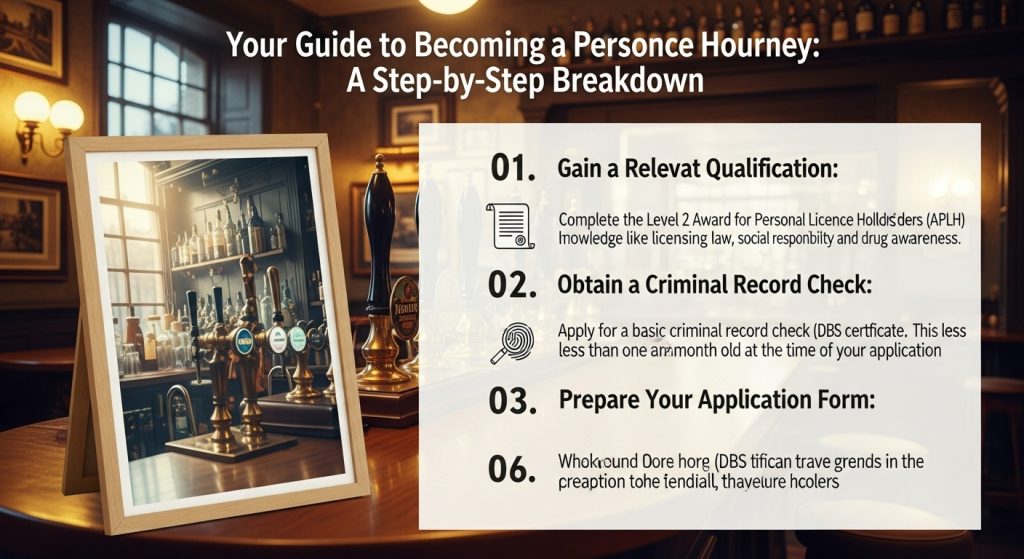
Maintaining Your Personal Licence: Beyond the Qualification
While a Personal Licence doesn’t technically expire, unlike some other professional qualifications, maintaining its validity and ensuring you remain compliant is an ongoing responsibility. For pub landlords and managers, this means more than just keeping the physical card safe.
Staying Updated with Licensing Law
The Licensing Act 2003, while foundational, can be subject to amendments and new interpretations. It’s crucial for Personal Licence holders to stay informed about any changes in legislation, local licensing policies, or best practice guidelines issued by organisations like the British Institute of Innkeeping (BII) or UKHospitality. Subscribing to industry newsletters, attending webinars, or regularly checking government and trade body websites can help you remain abreast of developments. SmartPubTools.net also provides regular updates and resources to help you stay compliant. Proactive learning ensures you can adapt your pub’s operations to any new requirements, safeguarding your licence and your business.
Reporting Changes and Convictions
It is a legal requirement to notify your local licensing authority if there are any changes to your name or address. More critically, you must also notify the authority if you are convicted of any relevant offence (as defined in the Licensing Act 2003) or if you are required to pay a penalty for a relevant offence. Failure to do so can lead to serious consequences, including fines or even the revocation of your Personal Licence. Transparency and prompt reporting are key.
Safeguarding Your Licence
Your Personal Licence card is a valuable document. Treat it as such. Keep it in a safe place, ideally separate from your wallet, to avoid loss or theft. While it doesn’t need to be displayed in your pub, you must be able to produce it if requested by a Police officer or an authorised person from the licensing authority. Losing your licence means you’ll need to apply for a replacement, incurring fees and administrative hassle. Furthermore, remember that your licence can be suspended or forfeited by a court if you are convicted of certain offences. Upholding the principles of responsible alcohol sales and adhering to all legal obligations is paramount to protecting your licence and your livelihood.
The Importance of Continuous Professional Development
Beyond legal mandates, continuous professional development (CPD) is vital for any pub professional. This could include further training in areas like responsible gambling, conflict resolution, food hygiene, or cellar management. While not directly related to the Personal Licence itself, these skills contribute to the overall responsible and efficient operation of your pub, indirectly supporting your ability to maintain your licence by running a well-managed establishment. SmartPubTools.net offers a suite of features designed to help you manage staff training records, ensuring everyone on your team is up-to-date with their essential qualifications and skills, contributing to a robust, compliant, and thriving business.
Your Essential Personal Licence Toolkit & Ongoing Compliance Checklist
Equipping yourself and your team with the right knowledge is paramount for running a compliant and successful pub. This toolkit and checklist will guide you through the Personal Licence process and highlight essential practices for ongoing compliance.
Personal Licence Holder’s Toolkit & Checklist
- Choose Your APLH Provider: Research and select one of the top providers reviewed in this guide (e.g., Innpacked, Personal Licence Hub) that suits your learning style and budget.
- Complete APLH Training: Dedicate sufficient time to study the course material thoroughly. Utilize all provided resources, including mock exams.
- Pass the APLH Exam: Aim for a high score, but don’t worry if you need a resit – many providers offer one.
- Obtain a Basic DBS Check: Apply for this via Gov.uk well in advance, ensuring it’s recent (within 1 month of application).
- Prepare Passport Photos: Get two current passport-sized photos, one endorsed by a ‘responsible person’.
- Complete Personal Licence Application Form: Fill out the form from your local council accurately and completely.
- Submit Application to Local Council: Send all required documents and the £37 fee to the licensing authority in your residential area.
- Safeguard Your Personal Licence: Once received, keep your licence card safe and secure.
- Stay Updated on Licensing Law: Regularly check for legislative changes and industry best practices.
- Notify Authorities of Changes: Inform your council of any change of address, name, or relevant criminal convictions promptly.
- Implement Robust Compliance Systems: Use tools like SmartPubTools.net to manage licence expiry dates, staff training, and compliance records.
- Train Your Team: Ensure all staff involved in alcohol sales understand their responsibilities under your guidance.
Ready to take control of your pub’s compliance and operational efficiency?
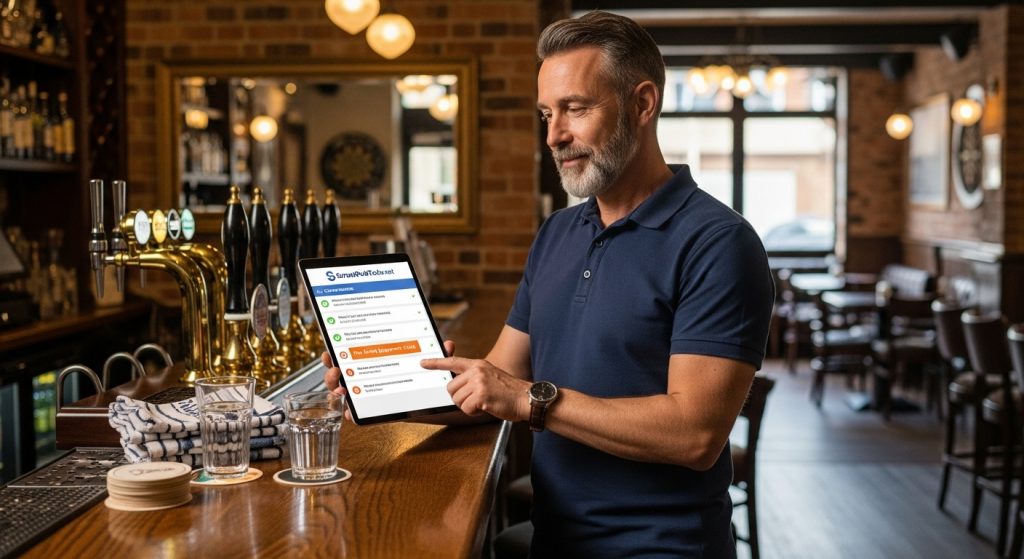
Start your 14-day FREE trial of SmartPubTools.net today! Our intuitive platform helps you manage everything from licensing renewals and staff training to stock control and marketing – all designed specifically for UK pub landlords. Unlock powerful features that save you time and money, ensuring your pub runs smoothly and legally. Click here to start your free trial!
Case Study: The “Rising Sun” Pub’s Compliance Transformation
The “Rising Sun” pub in Bristol, a traditional local facing declining sales, decided to invest in its team’s licensing knowledge. Owner Sarah Jenkins, always keen on efficiency, opted for an online APLH course for her new manager, Tom. She chose a provider known for its interactive modules and mock exams. Tom completed the course in a week, passing his exam with flying colours. Not only did this empower Tom to apply for his Personal Licence, but Sarah also implemented SmartPubTools.net to streamline their entire licensing management, from tracking licence expiry dates to managing staff training records. This proactive approach not only ensured compliance but also freed up Sarah’s time, allowing her to focus on revitalising the pub’s menu and event schedule. Within six months, the Rising Sun saw a 15% increase in wet sales and a significant boost in customer satisfaction, largely due to a more confident and compliant management team.
Key Facts: Personal Licence & APLH
| Label | Value | Source |
|---|---|---|
| APLH Qualification Requirement | Mandatory for Personal Licence application | Licensing Act 2003 |
| Average Course Cost (Online) | £99 – £180 | Industry Average (2024) |
| Average Course Cost (Classroom) | £150 – £250 | Industry Average (2024) |
| Personal Licence Application Fee | £37 (payable to local council) | Gov.uk |
| Personal Licence Expiry | Does not expire (unless revoked/forfeited) | Licensing Act 2003 |
| DBS Check Requirement | Basic DBS check required for application | Gov.uk |
| Training Time (Online) | 4-8 hours self-study | Provider Estimates |
| Training Time (Classroom) | 1-2 full days | Provider Estimates |
Frequently Asked Questions (FAQs) for Pub Landlords
Q: What is the APLH qualification and why do I need it?A: The APLH (Award for Personal Licence Holders) qualification is a mandatory requirement for anyone wishing to apply for a Personal Licence in England and Wales. It demonstrates that you have the necessary knowledge of licensing law and the responsibilities associated with selling alcohol.Q: Can I complete my Personal Licence training entirely online?A: Yes, many reputable providers offer online APLH courses. These are often flexible, allowing you to study at your own pace. However, the final exam typically needs to be invigilated, either online via webcam or in a physical test centre, to maintain its integrity and meet regulatory standards. Always check the provider’s specific exam arrangements.Q: What happens after I pass the APLH exam? How do I get my actual licence?A: After passing your APLH exam, you’ll receive your certificate. You then need to apply to your local licensing authority (the council where you live) for the Personal Licence itself. This involves completing an application form, providing your APLH certificate, a criminal record check (DBS), two passport-sized photos, and paying a fee. SmartPubTools.net offers resources to guide you through this application process.Q: Does a Personal Licence expire or need to be renewed?A: No, a Personal Licence does not expire. However, if you commit certain offences, it can be suspended or forfeited. It’s crucial to stay updated with any changes in licensing law, although there’s no formal ‘renewal’ process like there used to be. Your APLH qualification, once obtained, also doesn’t expire.Q: Do I need a Personal Licence if I own a pub but don’t serve alcohol myself?A: While you can own a pub without a Personal Licence, you cannot authorise the sale of alcohol on the premises. Every premises selling alcohol must have a Designated Premises Supervisor (DPS) who holds a Personal Licence. If you are the owner and wish to be the DPS, you’ll need one. Otherwise, a staff member with a Personal Licence must fill that role.
Conclusion
Securing your Personal Licence is more than just a legal requirement; it’s an investment in your pub’s future, your career, and the safety of your patrons. By choosing one of the best APLH training providers in the UK, you’re laying a solid foundation for responsible alcohol sales and operational excellence. Don’t let licensing complexities hold you back. Empower yourself and your team with the right training and the right tools. The journey to a fully compliant and thriving pub starts with an informed choice and a commitment to best practices. Make that choice today and watch your business flourish.
Ready to Master Your Pub’s Compliance & Operations?
Obtaining your Personal Licence is a crucial step, and managing your pub’s daily operations efficiently is the next. Don’t let compliance headaches or administrative burdens slow you down.
✓ Start Your 14-Day FREE Trial of SmartPubTools.net: Discover how our all-in-one platform can revolutionise your pub management. From licence tracking and staff training to stock control and marketing, SmartPubTools.net empowers you to run a compliant, profitable, and thriving pub.
- Streamline Compliance: Never miss a renewal or update.
- Boost Efficiency: Automate tasks and free up valuable time.
- Enhance Profitability: Optimise stock, manage staff, and drive sales.
- Gain Peace of Mind: Know your pub is always running legally and smoothly.
